On 30 January, nearly 100 members of AREF and the Better Buildings Partnership (BBP) gathered at Accenture's office for an over-subscribed breakfast seminar to explore the practical realities of decarbonising buildings.
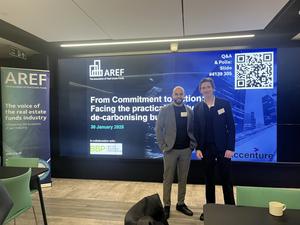
The event aimed to:
- Identify areas where collective challenges necessitate collaboration and policy support.
- Adopt a systems thinking approach to effectively address these challenges.
- Consider the broader long-term political, economic, social, and technological challenges impacting the decarbonisation of buildings.
The event highlighted a shift in perceptions as the discussions evolved. Initially, the focus was on the lack of data, but it soon became clear that the key challenge was the lack of regulatory and policy support. This has now become the primary barrier to progress, and event 2 will look to address these regulatory and policy gaps.
Keynote Highlights
Joey Aoun, Net Zero & Sustainability Lead at Savills Investment Management and Visiting Instructor at UCL, set the scene with a compelling keynote. Joey emphasised the immense opportunities and challenges in the sector, with a systems thinking approach being crucial to tackling these complex issues:
- Less than 1% of global real estate is invested in impact products, presenting vast untapped potential.
- Electrification faces significant hurdles, including infrastructure gaps and energy cost disadvantages.
- Warehouse retrofits demonstrate clear ROI, rental premiums, and co-benefits, proving that sustainability drives value.
- The funding gap in government commitments increases reliance on private capital.
- Skills shortages, knowledge gaps, and overwhelmed ESG teams necessitate a people-first approach.
- The shift from "mono-capitalism" to "multi-capitalism" is underway, prioritising financial, environmental, and social value.
- Achieving the UK’s 2050 goals requires retrofitting one building every 35 seconds.
Panel Discussions and Roundtables
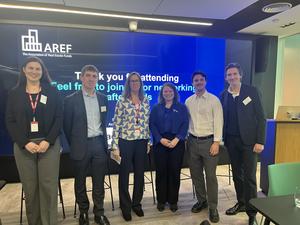
The event featured engaging panel discussions and roundtables moderated by industry experts. Key topics included:
- Operational carbon
- Construction & development
- Data and reporting challenges, including the role of certification, ratings, and verification
- Target backtracking and regulations
- Maintaining momentum in the face of organisational barriers and buy-in
- Justifying the transition from brown to green and raising capital, including the role of impact funds
- The role of real estate finance and debt
- Financial models and building the business case
- Alignment between landlords and tenants
- Building engagement within an organisation and supply chain
- The industry need for reskilling
Economic Challenges of Retrofitting: One of the primary discussions centred around the economic challenge of turning a normal office into a green office. Evaluating the ROI often proves uneconomic, presenting a significant challenge. The suggestion was to follow the money and find ways to make it economically viable.
Data and Understanding: Another critical point raised was the difficulty in managing data quality and sustainability compared to financial data. This can slow momentum within the C-suite in terms of decision-making. Education is seen as a crucial factor in maintaining momentum.
Political Context: The ever-changing political context and its impact on investors and their commitments were also discussed. Despite the political turmoil, European and UK investors remain committed to net zero, with no significant changes expected in their approach.
Upskilling and Education: The need for upskilling and education was a recurring theme. There is an urgent need for a large number of people with the same skill set to address the challenges quickly. Developing new programmes to upskill and educate can also enhance diversity and inclusion by reaching out to those who may have been excluded from the sector or are on career breaks.
With special thanks to our speakers:
Moderators:
Oliver Light, Head of Sustainable Real Estate, Accenture
Sarah Ratcliffe, CEO, The Better Building Partnership (BBP)
Keynote:
Joey Aoun, Net Zero & Sustainability Lead, Savills Investment Management
Panelists:
Ryan Brown, Sustainability Building Expert, Accenture
Emily Hamilton, Chief Sustainability Officer, Savills IM
Lina (Magdalini) Makrodimitri, Energy & Carbon Lead, Schroders
Hugh Garnett, Senior Specialist Real Assets at Institutional Investors Group on Climate Change
A thank you to our table moderators:
Andres Guzman Ramirez, Tishman-Speyer, Senior Director, Head of ESG Europe
Hugh Garnett, IIGCC, Senior Specialist Real Assets
Saryu Vatal, Accenture, Senior Manager, Real Estate Decarbonisation Specialist.
Sam Carson, CBRE, Head of Sustainability, Valuations and Advisory Services
Laura Noctor-King, BBP, Head of Sustainability – Engagement
Peter Cosmetatos, CEO, CREFC
Caroline Clarke, Sustainability MD FS, Accenture
Jon Williams, Managing Director & Global Financial Services Sustainability Leader, Accenture
Connor Storkey, Head of Sustainability Brookfield Real Estate UK
Alan Page, ESG Director Europe & APAC, M&G
Kathryn Barber, Head of ESG, Orchard Street
Collaborations
In partnership with The Better Buildings Partnership:

Special thanks to Accenture for hosting this event:

Related links:
Slides:
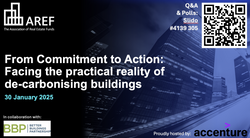
Article:
Decarbonising Real Estate: The Five Key Challenges You Must Address in 2025
Photos:
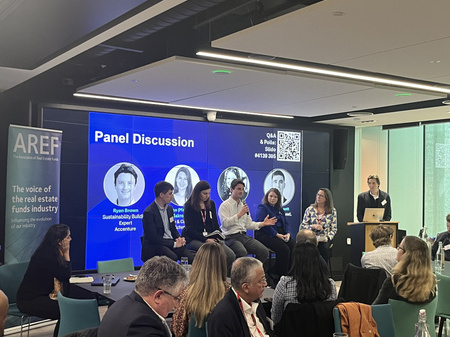

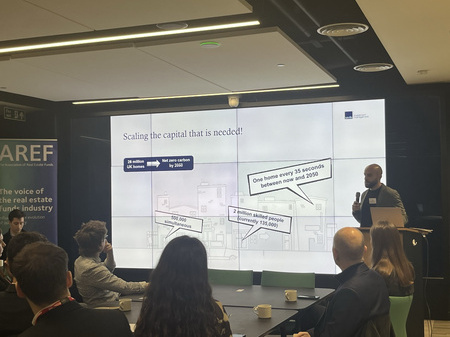

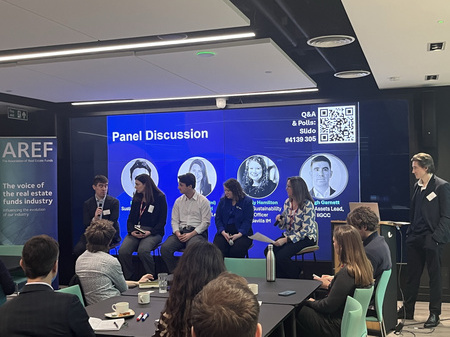
Next steps:
The ESG & Impact Investing Committee will soon be organising the second installment in this series, to take place later in H1 2025. Please look out for communications on this event.
Enquiries:
If you would like to discuss this event or any of the topics highlighted, please email us in the first instance and we will ask one of our ESG & Impact Investing Committee members to get in touch.

